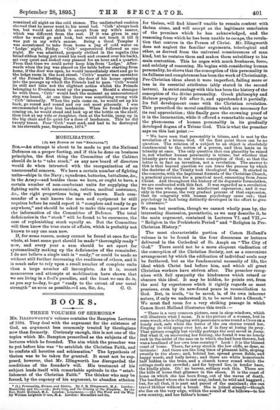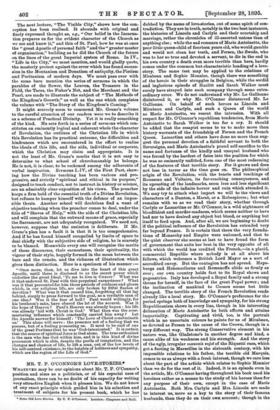BOOKS.
THREE VOLUMES OF SERMONS.*
Mn. Inntscrwoarrn's volume contains the Bampton Lectures of 1894. They deal with the argument for the existence of God, an argument less commonly treated by theologians now than formerly. Curiously enough, this is not one of the topics which Mr. Bampton prescribed as the subjects of the lectures which he founded. The aim which the preacher was to put before him was "to establish the Christian Faith, and to confute all heretics and schismatics." The hypothesis of theism was to be taken for granted. It must not be sup- posed, however, that Mr. Illingworth has disregarded the conditions of the founder's will. His treatment of his subject lends itself with remarkable aptitude to the " estab- lishment of the Christian Faith." The thinker who may be forced, by the cogency of his argument, to abandon atheism • (1.) Personality, Human and Divine. By J. R. Illingworth, M.A. London : Macmillan and Co.—(2.) God's City, and the Coining of the Kingdom. By the Rev. Scott Holland, M.A. London: Lonemane.—(3.) The Word and the Way. By William Leighton G. ane, M.A. London: Macmillan and Co.
for theism, will find himself unable to remain content with theism alone, and will accept as the legitimate conclusion of the premises which he has acknowledged, and the reasoning from which he has been unable to escape, the revela- tion that centres in the Person of Christ. Mr. Illingworth does not neglect the familiar arguments, teleological and other, as derived from the universal consciousness of man kind, but he restates them and makes them subsidiary to his main contention. This he urges with much freshness, force, and subtlety of reasoning. He begins with considering human personality, he shows that the conception of this personality in its fullness and completeness has been the work of Christianity.
Pre-Christian ideas about it were imperfect, failing more or less in its essential attributes (ably stated in the second lecture). In strict analogy with this has been the history of the conception of the divine personality. Greek philosophy and Hebrew prophecy felt after it, and apprehended it partially. Its full development came with the Christian revelation.
This prescribed the moral conditions which are necessary for
its real appreciation ; this finally gave the crowning proof of it in the Incarnation, while it offered a remarkable analogy to the phenomena of human personality in its gradually developed dogma of a Triune God. This is what the preacher says on this last point :- " We have seen that personality is triune, and is met by the revelation of a triune God. Of the first point there can be no question. The relation of a subject to an object is absolutely fundamental to the notion of a person, and thus lands us in triunity at once. The only question that can plausibly be raised is, not whether human personality is triune, but whether that triunity gave rise to our triune conception of God ; so that the latter is in fact an invention, not a revelation. The answer to this is that beyond question we can trace the process by which the doctrine of the Trinity took theological form. It started in the concrete, with the baptismal formula of the Christian Church, a practical provision for a practical need, emanating from Jesus Christ. And throughout the history of its dogmatic formulation, we are confronted with this fact. It was regarded as a revelation by the men who shaped its intellectual expression ; and it was only in the process, the very gradual process of that expression, that its congruity with human psychology came out; that psychology in fact being distinctly developed in the effort to give it utterance."
We can but mention, though we cannot wholly pass by, the interesting discussion, parenthetic, as we may describe it, to the main argument, contained in Lectures VI. and VII.,—
"Religion in the Prehistoric Period" and "Religion in Pre- Christian History."
The most characteristic portion of Canon Holland's volume is to be found in the four discourses or lectures delivered in the Cathedral of St. Asaph on " The City of God." There could not be a more eloquent vindication of the conception of the Christian Society, not as a convenient arrangement by which the edification of individual souls may be furthered, but as the fundamental necessity of life, the ideal which Christ had before him, and which all great Christian workers have striven after. The preacher recog- nises with full sympathy the hindrances which retard or obscure this ideal. It may be hidden, he points out, from the soul by experiences which it rightly regards as most precious, even by its new-found peace in reconciliation to God. But, in truth, "to be saved, is, of its own inherent nature, if only we understood it, to be saved into a Church." We must find room for a very striking passage in which Canon Scott Holland illustrates this truth :—
" There is a very common picture, seen in shop.windows, which will illustrate what I mean. It is the picture of a woman, lost in some wreck, who is clinging with passionate arms round a Cross on a lonely rock, safe while the terror of the sea storms round her, flinging its wild spray over her, as if in fury at losing its prey. That picture roughly but vividly portrays the soul saved in Jesus. But what if, on recovering her footing, she found it was no lonely rock in the midst of the seas on to which she had been thrown, but was a headland of her own true country ? Look ! it is the blessed coast of home. There, far away stretch the low cliffs, so dear, so intimate ! And there are the long lines of pleasant hills, sloping sweetly to the shore; and, behind her, spread green fields, and happy woods, and leafy lawns; and there are white homesteads Itslf hidden in the trees, and a church tower round which the cottage roofs are crowded ; and far beyond lies, in tender haze, the kindly plain. Oh ! no barren, solitary rock this. These are the hills of home that glimmer in the sheen. It is the coast of home on which she has been flung, out of the waves of death. The headland where she is cast may, indeed, be wild and haggard ; but, for all that, it is part and parcel of the mainland; she can travel thither without a break. She is joined already—though she lies on the very edge, within the sound of the billows—to her own country, and her father's house."
The next lecture, "The Visible City," shows how the con- ception has been realised. It abounds with original and
finely expressed thought as, e.g., " Our belief in the Incarna- tion prepares us for the evident character of the Church as
we see and know it," and this of St. Paul, how he was at once the " great Apostle of personal faith " and the " greater master of organisation," building as he did the Church of the future on the lines of the great Imperial system of Rome. In IV., "Life in the City," we must mention, and would gladly quote, the masterly protest against the error which has found succes- sion in the Montanism and Donatism of antiquity, the Pietism and Puritanism of modern days. We must pass over with the same bare mention the series of sermons in which the parables of the Sower, the Leaven, the Treasure in the Field, the Tares, the Fisher's Net, and the Merchant and the Pearl, are made to illustrate the subject of " The Methods of the Kingdom's Growth," as well as the one which completes the volume with "The Story of the Kingdom's Coming."
It might scarcely seem to commend Mr. Grane's volume to the careful attention of our readers were we to describe it as a scheme of Practical Divinity. Yet it is really something of the kind. He sets forth in a series of sermons which con- stitutes an eminently logical and coherent whole the character of Revelation, the outlines of the Christian life in which this Revelation has its practical outcome, the difficulties and hindrances which are encountered in the effort to realise the ideals of this life, and the aids, individual or corporate, which the Christian may claim and appropriate. It is not the least of Mr. Grane's merits that it is not easy to determine to what school of chnrchmanship he belongs. He is not, it is clear, to be reckoned among the adherents of verbal inspiration. Sermons I.-IV, of the First Part, show- ing how the Divine teaching has been various and pro- gressive, and strictly " spiritual and ethical in its purpose," designed to teach conduct, not to instruct in history or science, are an admirably clear exposition of his views. The preacher keeps a firm hold of the essential truth of a Divine Revelation, but refuses to hamper himself with the defence of an impos- sible thesis. Another school will doubtless find a want of objective teaching when the preacher comes to deal, under the title of "Staves of Help," with the aids of the Christian life, and will complain that the outward means of grace, especially the Sacrament, are not adequately recognised. We need not, however, suppose that the omission is deliberate. If Mr.
Grane's plan has a fault it is that it is too comprehensive. And if he has found himself compelled by limits of space to deal chiefly with the subjective side of religion, he is scarcely to be blamed. Meanwhile every one will recognise the merits of these discourses, their earnestness, their spirituality, the vigour of their style, happily formed in the mean between the bare and the ornate, and the richness of illustration which gives them distinction. Here is a specimen of his manner :-
" Once more, then, let us dive into the heart of this great Apostle, until there is disclosed to us the secret power which underlies the great Ideal, To me to live is CHRIST.' What was it that endowed St. Paul with this perpetual earnestness ? What was it that prevented for him those periods of coldness and gloom which, in our religious life, are only broken by fitful flashes of devotion ? What was it that caused him, forgetting all that lay behind, simply to press forward to the goal, as a veritable man of one idea ? Was it the fear of hell ? Paul would willingly, for his brethren's sake, have shared the lot of the accurst. Was it the hope of Heaven ? Paul's Heaven was already begun : his life was already hid with Christ in God' What then was the over- mastering influence which constantly carried him away ? Let the Apostle answer for himself : The Love of Christ constraineth us.' This alone will serve : the presence not of a feeling that we possess, but of a feeling possessing us. It used to be said of one of the great Puritans that he was God-intoxicated.' It is certain that the source of spiritual force is God alone. The true enthusiast is the man who has God within him, and it is this kind of divine possession which is able, despite the perils of temptation, and the changes and chances of life, to lift a man, out of the low levels of his self-centred existence, to the heights of holiness and sympathy, which are the region of the Life of God."







































 Previous page
Previous page